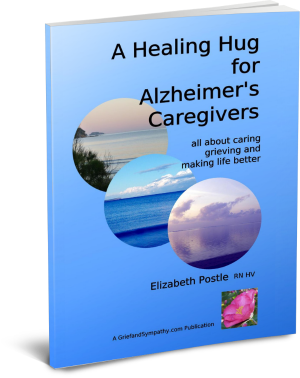Alzheimer's Caregivers Tips - How to Spot Pain
Elizabeth Postle, owner and matron of a nursing home for 15 years, talks about pain and dementia, and explains how to tell if a person with dementia or Alzheimer’s is in pain and what to do about it. She provides help for Alzheimer's caregivers in the form of education and training, through her website and her book.
How do you know when someone with dementia or Alzheimer's is in pain?
All parents of young babies know that they have to recognize the cry of hunger or colic, babies cannot tell you that they have teething pain. Similarly caregivers of people with dementia or Alzheimer’s have to recognize changes in behavior patterns to ascertain that something is wrong. People with dementia don’t know how to tell you that they have pain.
A few signs of pain for Alzheimer's Caregivers to be aware of. . .
Any of these signs may mean that your loved one is in pain but is unable to explain what is wrong:
- They may be more agitated.
- Nights may be disrupted more than usual.
- Aimless wandering may be a new symptom.
- They may have developed a temperature.
- Are they noisy - shouting more than usual?
- Is the sufferer’s incontinence worse than usual?
- Are they becoming aggressive?
- Has the loved one suddenly become unable to walk?
Any of these changes or unusual behavior should be reported to the Doctor as your loved one is unable to say I have earache or colic or explain what is wrong.
Look out for changes of behaviour which might indicate pain
When we are caring for someone on a daily basis any change of behavior is easier to notice. Is the loved one restless and more agitated than usual? Could it be that they are constipated, for example and have colic?
Have they had a cold recently? Could they have a sore throat or a chest infection?
Has there been any change in their appetite? Are they eating less than usual? This could indicate a dental problem. Regular dental checks are essential as they could have a problem which could prevent them eating well and cause pain.
Are they wandering around the home more? Is incontinence of urine a new symptom which could indicate a urine infection? Is their temperature normal?
Whilst helping to shower the loved one, the carer should become aware of any skin problems. Are there any sore areas or rashes seen?
Do they need a podiatrist visit? A corn or long toenail can cause discomfort.
Remember to give people with dementia lots of drinks during the day. Always have mugs of water available for them as dehydration can cause problems too. They cannot tell you they are thirsty and it can cause them discomfort.
Any changes of behavior could be a sign of discomfort. Are they noisier than usual, this can be a sign that they have pain.
Has their sleeping pattern changed? Any discomfort will prevent your loved one from falling asleep as well as they used to.
If in any doubt then a doctor’s visit is the safest bet. People with Alzheimer's cannot explain the pain they have and like everyone can fall victim to other illnesses.
Caregivers do a great job and deserve all the help they can get so must never be afraid to ask for advice from doctors, dentists, pharmacists, podiatrists, physiotherapists and any of their care team members.

What to do about pain if your loved one has dementia or Alzheimer’s disease.
Sometimes pain relief and antibiotics are all that are needed to relieve a difficult new situation. Because someone has dementia, it does not mean that they are immune from all the other ailments we can suffer from. We can explain that we have back pain or neck ache but they cannot. It is up to the carer to notice that all is not well and report your suspicions to the doctor. He or she can examine your loved one and pain relief can be given as needed.
Never be afraid to voice your concerns no matter how trivial, because to save your loved one from pain is very worthwhile.
My book is full of Alzheimer's Caregivers Tips:
I have written a book all about caring for your loved one with dementia or Alzheimer’s. I have focused on the needs of the caregiver who is often grieving and in need of much support, as well as the best ways to care for the person with Alzheimer's. Click on the image to see what else it includes.
More Pages of Alzheimer's Caregivers Tips:
Understanding unusual behaviours in Alzheimer's
7 Warning Signs You Have Alzheimer's Spouse Grief
- Grief and Sympathy Home
- Alzheimer's Spouse Grief
- Alzheimer's Caregivers Tips
